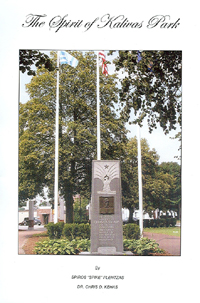 |
|
|
Book Release for The Spirit of Kalivas Park [Manchester, New Hampshire] by Spiros Plentzas and Dr. Chris D. Kehas |
|
 Cover photo by Nicole Vailas |
Title: The Spirit of Kalivas Park Authors: Spiros Plentzas and Dr. Chris D. Kehas Publisher: Lafayette Press Inc. Place and Date of Publication: Manchester, NH, 2005 ISBN: na Price: $4.00 per copy, including S&H in U.S.; $12.00 per copy outside US. Description: Softcover, 50 pages, and numerous illustrations Availability: Make requests to Dr. Chris D. Kehas, PO Box 545, Manchester, NH 03105-0545 |
At last there is a nicely written account of the creation and dedication of Kalivas Park in Manchester, NH, a site dedicated to the memory of Christos Kalivas, the first Greek-American from Manchester killed in World War I. One of his fellow combatants, Chris Agrafiotis, formed a committee of WWI veterans of Greek descent and worked tirelessly with city and federal officials to develop a fitting tribute to the sacrifice of Kalivas and all Greek-Americans from Manchester. Although there is a significant Greek presence in Manchester, with three churches, one of them a cathedral, few persons are aware that New Hampshire has the distinction of having one of the highest percentages in the country of citizens of Greek descent. Kalivas Park, as Park Common was renamed during its formal dedication, was the hub of the Greek community in Manchester, having taken on the characteristics of a village "plateia" or square because of the surrounding Greek businesses and residences. The dedication of Kalivas Park became more than a recognition of the sacrifice of the first heroic Greek-American soul in the Great War; it became a public recognition of the contribution of Manchester's Hellenic community to the entire city, to the very fiber of Queen's City, as Manchester is called. The establishment of the park was well researched, and the account includes copies of relevant documents and photos from the dedicatory ceremonies. Included are copies of the initial letters of application and correspondence to local and state officials from the veterans' committee, as well as of newspaper accounts of the dedication--and rededication several decades later. But they expanded upon the scope of the topic to place the founding of the park within the broader history of the local Greek community. Genealogists and family history researchers will appreciate the use of city directories to enrich the historical account; at the back there appear listings of Greek residents and businesses within the Greek section surrounding Kalivas Park. Just as valuable is the introduction to The Spirit of Kalivas Park where the authors have nicely described the ambience of this Hellenic district at the time of WWI: " [we] remembered a simpler time when there were card games at the corner of Cedar and Pine Streets in front of Samara's grocery store, lambs hanging in Nassikas' butcher shop, black olives at the Tyrna Market, and freshly baked bread at Copadis' bakery. . . ." and also "housing was in tenements, better described as cold-water flats. There were no single family homes. . . . hard it was when compared to today; but it was better than it had been for many of our parents and grandparents coming from Greece. . . " In 2002 the park was rededicated, giving public recognition to the "ethnic and cultural diversity of . . .[the Greek] neighborhood, and of its place in the tapestry of Manchester, and of America" as Dr. Kehas noted in his keynote address on that day. "In Manchester, we have Lafeyette Park, Pulaski Park, Henry J. Sweeney Memorial Park, and even Hogan's Field which was renamed Sheridan-Emmett Park. But here it was Park Common named for Park Street which later was renamed Lake Avenue. Informally, it was known as the Greek Common and it was the vision of Chris J. Agrafiotis which transformed the dream into a reality." Dr. Kehas concluded his address by pointing out an important difference between the Greek immigrants of the U.S. and those elsewhere in the Diaspora: "If you go to live in another country, as many Greeks went to Australia and to Germany, you remained Greek. They were still Greeks living in another country. But in America, they became Americans. What are they doing today? We have been woven into the fabric of American Life. Immensely proud of our Hellenic Heritage, we are even prouder to be Americans. We are all Americans." The publication of The Spirit of Kalivas Park has been made possible through a generous grant of the James and Olga Pananos Charitable Trust. Authors Plentzas and Kehas acknowledged the editorial assistance of Jane Corbett and research assistance of Dr. Percy Agrafiotis, Georgia Nacos, Martha Galanis and Vasiliki (Doumousiaras) Papajohn. Greek-Americans from Manchester, New Hampshire will surely wish to own a copy of this booklet. For younger Granite-staters of Hellenic descent, the book can offer a clear glimpse into the era of their grandparents or great-grandparents, generations of visionary pioneers who established enclaves of Greek learning and tradition in northern New England. Persons researching their own family history--even if based in other areas of New England--may find the format of the book and depictions of the local "plateia" helpful as they gather details about their ancestors. In all, the book is a serendipitous find and documents a key component of Hellenic heritage in New Hampshire. |
|
HCS readers may wish to read releases or announcements of other books in our Books section or in our extensive, permanent archives at the URL http://www.helleniccomserve.com/archivebookreviewsandreleases.html. For more information about Greek history or genealogy, consult the webpages for Hellenic Historical and Genealogical Association hosted by HCS at the URL http://www.helleniccomserve.com/genealogy.html. |
|
|
|
|
|
|
|
2000 © Hellenic Communication Service, L.L.C. All Rights Reserved.
http://www.HellenicComServe.com |
|
